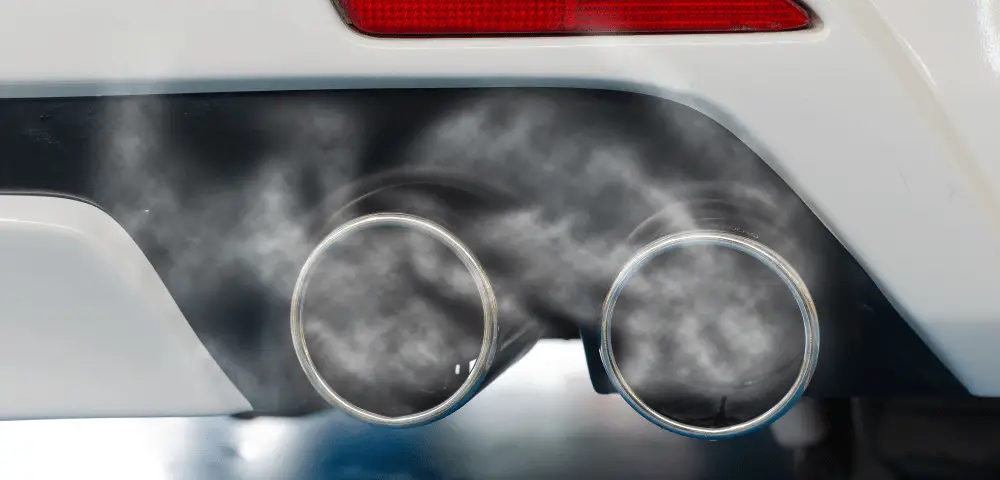Some of the noises a car makes are completely normal, such as the humming of tires or swishing of the windshield wipers.
Other sounds, however, are pretty odd; and they require a closer examination.
For instance, a clogged exhaust sound is unusual and it’s one that requires immediate attention.
A blocked exhaust produces different noises; ranging from a whirring sound to a hiss.
The following post highlights common exhaust problems that lead to these sounds and other signs to watch out for.
What Parts Make Up The Car Exhaust System?
The main components that make up the car exhaust system are:
- Exhaust manifold – this marks the first portion of the exhaust system and it’s connected directly to the engine. It’s responsible for collecting gases from the engine cylinders and directing them to other parts of the exhaust.
- Catalytic converter – Depending on the make of your car, it will have either a catalytic converter or a diesel particulate filter. Both of these parts are designed to remove toxic elements from the exhaust gases before they’re expelled.
- Silencer or Muffler – The role of this part is to dampen engine noise.
- Exhaust pipe – Once the exhaust gases have been filtered and their noise dampened, they’re released into the atmosphere through the exhaust/ tailpipe.
How Do You Know If You Have a Clogged Exhaust? Top – 9 Signs
Not sure whether you have a blocked exhaust on your hands? Watch out for these common signs:
1. Unusual Sounds
The most prominent sign that your automobile is experiencing an exhaust blockage is an unusual noise. It’s important to note that different exhaust problems may lead to different sounds.
So here’s a breakdown of the most common noises caused by exhaust problems:
2. Whirring sound
A whirring sound is very similar to the sound a portable fan makes when it’s switched on.
If you notice this kind of noise, the most likely culprit is a damaged pulley, belt, or one of those belt-driven components, such as the radiator fan or water pump.
3. Hissing sound
In this case, the exhaust system makes a noise similar to that of steam trying to escape a pressurized area.
If you hear this hissing sound, it’s likely the result of the engine overheating or an issue with the coolant system that leads to an exhaust leak.
Once this happens, you’ll hear a noticeable sound, and this stems from the steam leaking through the overflow tanks or the radiator cap.
4. Ticking sound
Under normal circumstances, the engine should run like a finely tuned clock. However, this doesn’t mean that it should sound like one.
So if you notice a ticking sound, it’s likely that your clogged exhaust problem has something to do with the engine.
The best way to diagnose this issue is to listen keenly and identify the specific area where the sound is originating from.
If it’s coming from the engine, then the cause is one metal coming into contact with another. This can happen when there’s low oil pressure in the motor or faulty hardware in the cylinder head.
Other times though, this noise is more like a knocking sound.
This is similar to the sound of metal balls being shaken vigorously in a tin can. It means that there’s premature combustion in the combustion chamber.
This leads to unequal distribution of power; hence, the knocking noise.
Generally, unusual sounds can be difficult to interpret. The best course of action is to take your vehicle to an auto shop for a more detailed inspection and diagnosis.
5. Reduced Fuel Economy
Have you noticed a decrease in your car’s fuel efficiency? If you have, it could be because of a blocked exhaust.
Over time, soot, grime, and dust start accumulating in the exhaust.
And once this happens, it reduces the amount of air flowing into the engine bay; thus, compromising the efficiency of the combustion process.
The end result is poor fuel efficiency.
6. Bad Stench of Gases
Have you noticed an odor, similar to a rotten egg smell or that of a sewer?
If you have, there’s a high probability that your exhaust is clogged.
When combustion takes place in the engine, it leads to the production of toxic gases like hydrogen sulfide.
When the exhaust is working properly, the catalytic converter converts these gases into less toxic forms while eliminating their unpleasant smell in the process.
However, if it’s blocked, then it won’t play its conversion role; hence, the bad stench.
7. Misfiring Engine
One of the surest signs that your exhaust is clogged is when the engine misfires. This is when it stumbles for a moment before regaining its usual pace.
It’s a sign that the combustion isn’t reaching the completion stage – a problem that’s often caused by blocked gases within the exhaust system.
8. Burning Smell From Engine
After a while, the engine can develop minor oil leaks, which typically remain undetected.
But, if this leak happens in an elevated part of the engine and the oil ends up dripping down, it could burn the exhaust pipe; hence, the burning smell.
So if you notice a weird smoldering smell inside the vehicle, ensure you get the exhaust system inspected immediately.
9. Car Moving Slowly
If you have a blocked exhaust, it means that the exhaust fumes aren’t being expelled from the car as they should.
If they remain trapped in the combustion chamber, this limits the space needed for fresh air and fuel to ignite.
The end result is that the car engine loses power, which is why it struggles to accelerate and maintain speed. So if you’ve noticed your vehicle moving slower than usual, be sure to get this issue checked.
What Happens if Exhaust Is Blocked?
If you have a clogged exhaust, the first thing you’ll likely notice is an unusual sound. This stems from the exhaust system struggling to expel harmful gases.
This will be followed by a loss of engine power, an unpleasant smell, and decreased fuel efficiency.
Sometimes, the check engine light comes on, alerting you to a problem in the combustion engine.
Can a car run with blocked exhaust?
Wondering whether your vehicle can run with a blocked exhaust? The answer is No.
Even if you’re able to start your car, chances are that it will start stalling and eventually lose power.
Besides, there’s a high risk of the exhaust fumes getting inside the cabin; hence, making it difficult for you to breathe.
How Do I Know if My Exhaust Needs Replacing?
You’ll know that your car’s exhaust system needs replacing if you notice any of the above symptoms.
Just to recap, these symptoms include a misfiring engine, burning or rotten smell, weird sound, and a decrease in the car’s engine performance.
How To Unclog A Muffler
You’ve inspected every component of the exhaust system and realized that a clogged muffler is the cause of your problems. How do you go about unclogging it? Follow these steps:
Step 1: Removing the muffler
Start by detaching the muffler from the exhaust system. The removal technique you use will depend on how it’s attached.
In some vehicles, the muffler is bolted to the exhaust pipe, and in others, it’s welded.
For the bolted version, all you have to do is untighten the bolts holding it in place. For the welded muffler, you’ll need to look for a hacksaw to cut it out of place.
Step 2: Cleaning
The next step involves cleaning the clogged exhaust.
To do this, pour a degreasing agent into a bucket. Ideally, this cleaning solution should be efficient and not contain any harsh chemicals that might cause more damage to the muffler.
Next, soak the muffler in the agent for a couple of hours (an overnight soak yields the best results). This leaves ample time for the solution to work its way; loosening any grime, rust, and dirt from the muffler.
Step 3: Rinsing
Once all the dirt is dislodged from the muffler, rinse it with some clean water. Rinse it thoroughly, ensuring that no residue of the degreaser is left. Once rinsed, leave it out to dry.
Step 4: Reassembly
Now that your muffler is clean, all that’s left to do is to reinstall it. Next, start your car and assess its performance.
Specifically, check whether the symptoms you were experiencing earlier have stopped.
If they have, you’ve successfully unclogged the muffler. But if they haven’t, you may be dealing with a more severe problem. In this case, you’ll need to get the muffler replaced.
Conclusion
A clogged exhaust sound can take different forms depending on the underlying issue. It could be a whirring, ticking, or hissing sound.
If it’s a whirring or vibratory sound, then the problem has something to do with the pulley or belt-driven parts.
Meanwhile, a ticking sound hints at incomplete combustion while a hissing sound means there could be an exhaust leak.
Generally, blocked exhaust sounds are pretty difficult to interpret and diagnose correctly. As such, you should consider taking your car to a professional mechanic if you hear any of these noises.



